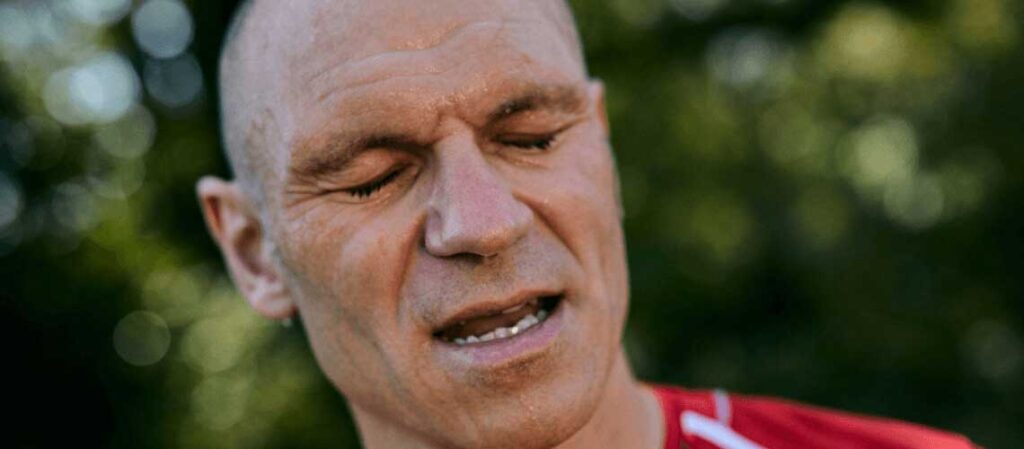
This is what you need to know if you have signed up for your first ultra marathon.
This is part of a series of posts that chart Gareth Kilshaw’s preparations to run 127-miles, on his birthday, for the RNLI. Raising some much needed funds for a great charity that has been impacted by COVID.
We speak to Gareth and his team, look at the training plan, recovery protocols, strength work and his nutrition.
This post reflects some of my experience of working with Gareth and his team. Of being immersed with some dedicated runners and amazing people.
It is a few nights before Halloween, Gareth Kilshaw is in great form. It is just 1 week until his epic run for the RNLI and he seems ready. He seems calm. He is prepared. The training plan has been executed, the weights lifted, and even his kit is packed.
It is a relaxed atmosphere as we chat, over Zoom, (such is life right now) with a glass of wine in hand. We are joined by his “chief ass kicker”, Nicola. Gareth has described her as his coach, but she quickly dismisses that concept with her wicked laugh by threatening to alter the final week of her even wickeder training plan!
Working with Gareth and his team over the last few weeks has been a blessing. I have been drawn into this ultrarunning world and, I have to say, I am inspired by it. The people. The personal stories. Their resilience and determination. I look up to them.
As I share my reflections, I find myself being recruited: gently teased towards signing-up for an ultra event. Whilst also being not so gently teased in general – mostly by Nicola!
As we laugh, we reflect on the preparation and all the work and we look forward to the event. At the outset, I had asked the question, “What on earth makes a runner want to go further than a marathon?”
When the modern Olympics were founded in 1896 the marathon was the blue-riband event, that signified the glory of ancient Greece. Its name has a mystique. It comes from legend. When news came that the Persians’ had been defeated in the Battle of Marathon the messenger did not stop running until he delivered that message to Athens.
We use the word “marathon” in our everyday lexicon to describe gruelling situations and epic events, “A marathon day in the office”, “A marathon shift”, “A marathon trip”.
The idea of doing more than a marathon sized portion of anything isn’t supposed to be appealing. And yet there are runners who want to go further than a marathon. And they love it.
Now that I know just a little more than I did, the best I can offer to explain the challenge of ultrarunning is that it is one-part physical, one-part mental and two-parts spiritual. And I am finding myself drawn to that mystique.
Having now been recruited and feeling already like there is no backing out, my mind turns to the horrors that could beset a debut ultramarathon.
I beg for wisdom. This is the kind of sport where you should avoid your own mistakes and learn from the misfortune of others. Gareth Kilshaw & Nicola Bruce begin to share:
This final sentiment sums-up Gareth and Nicola perfectly. It also chimes with the awesome GB Ultras community that is so close to their hearts. An individual, endurance sport with 11,000 team-mates.
I like the sound of it. I’m in.
And so I asked that community of Ultra runners the same questions. And then the anecdotes, advice and good vibes started flowing:
The most commonly cited “mistake” – was regretting not having entered their first ultra-years earlier.
Support Gareth Kilshaw's challenge by clicking on the Just Giving link below
Read our series of posts and learn how Gareth Kilshaw has prepared for the challenge:

 British Triathlon: Recovery Questions Answered
British Triathlon: Recovery Questions Answered
 The Injury Risk Equation
The Injury Risk Equation
 LJMU Study Findings
LJMU Study Findings
 What are shin splints?
What are shin splints?
 How to treat shin splints [2021]
How to treat shin splints [2021]
No Thanks – I’ll pay full price
Close Window
Close Window
[…] Lessons Learned – From Gareth, Nick and other Ultrarunner with scars to share […]
[…] https://riixo.com/gareth-127-ultra-tips/ […]